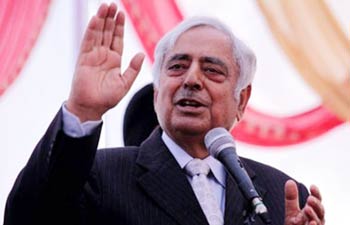Jammu, Feb 21: PDP patron Mufti Mohammad Sayeed will be the Jammu and Kashmir chief minister after his party reached an agreement for forming a government with the BJP, top party sources said Saturday.
 Sources close to PDP patron Mufti Muhammad Sayeed, who returned to winter capital Jammu Friday after spending a week in Mumbai, an agreement had been reached on all contentious issues between the PDP and the BJP.
Sources close to PDP patron Mufti Muhammad Sayeed, who returned to winter capital Jammu Friday after spending a week in Mumbai, an agreement had been reached on all contentious issues between the PDP and the BJP.
"Yes, main agreement has been reached on the draft of the CMP (common minimum programme) on contentious issues like article 370, armed forces special powers act (AFSPA) and the plight of West Pakistan refugees.
"It has been agreed that without any written reference to it, both the parties would respect the wishes of the people of the state in consonance with the constitution of the country with regard to article 370," a top party source said.
As per the agreement, Mufti Mohammad Sayeed will be the chief minister for the full six years.
The PDP insider who is engaged with the BJP in the dialogue process on government formation on behalf of his party also said instead of accepting the demand that the AFSPA should be revoked from the entire state within one year, it has now been agreed by the two parties that a committee would be formed which would recommend gradual, but timely, revocation of the act from areas in the state.
Sources in the BJP said: "The PDP has agreed to the BJP demand that the CMP should accept that the problems faced by West Pakistan refugees should not be politicized, but treated as a humanitarian issue that needs to be addressed on humanitarian grounds."
When asked to comment on media reports that government formation in the state was imminent because the PDP and the BJP had agreed on the draft of the common minimum programme (CMP) for
governance, party chief spokesman Naeem Akhtar told IANS in winter capital Jammu: "I am meeting Mufti Sahib today and if anything has been worked out, we will hold a briefing about it during the day."
Unlike his steady dismissal of any agreement with the BJP during the last nearly two months when he maintained the "structured dialogue between the BJP and the PDP had not even started", Akhtar sounded less circumspect Saturday about his lack of knowledge regarding an agreement on the common minimum programme with the BJP.
West Pakistan refugees are those over 25,000 families who came to the state after the India-Pakistan wars of 1947, 1965 and 1971.
Since these people were not citizens of the erstwhile state of Jammu and Kashmir as it existed before accession to India in 1947, they cannot vote in the state assembly elections, nor buy property in the state.
These refugees cannot apply for government jobs since all the state government jobs in Jammu and Kashmir are reserved for permanent residents of the state.
As an anomaly, the West Pakistan refugees can vote in the parliament elections, but not in the state assembly elections since the state has a constitution of its own in addition to the country's constitution and both apply concomitantly to the state.
With regard to the PDP demand on return of NHPC owned hydro-electric power projects in the state to state ownership, the sources said it had been agreed that the two would work together for central assistance for state ownership of these projects.
"The nuts and bolts job has been completed. All that now remains is an announcement on the agreement between the two which could be made within the next two to three days," said sources.
The sources added that Mufti Mohammaad Sayeed would formally call on Prime Minister Narendra Modi after the PDP and the BJP announce having formalized the draft of the CMP.






Comments
Add new comment